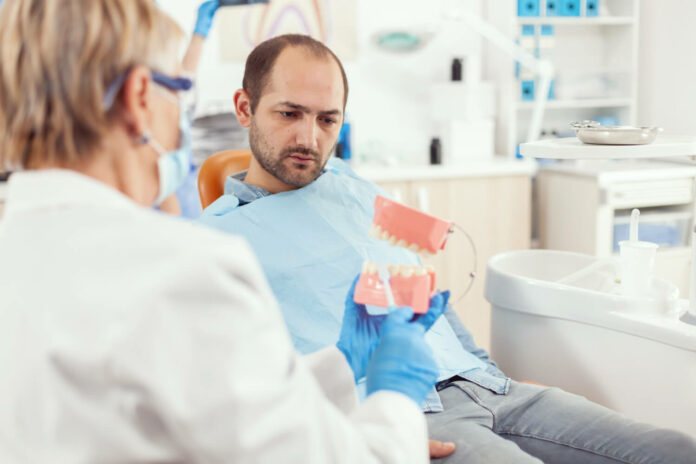Your dental implant hurts when chewing? Experiencing pain while chewing after a dental implant can be concerning. While some discomfort is normal during recovery, persistent pain could be a sign of underlying issues that require attention.
This can happen because of a misalignment, infection, or other complications, so early detection and care are important for preventing implant failure.
Dental Implant Hurts When Chewing: What Could This be a Sign of?
If you’re experiencing discomfort while chewing after a dental implant, it could be a sign of underlying issues that may lead to implant failure. Proper aftercare is essential, and recognizing symptoms early can help prevent complications.
Here are some common signs to watch for:
Teeth Grinding
While teeth grinding may appear later, it’s often stress-induced. However, if you grind your teeth without stress-related triggers after getting an implant, it could indicate misalignment.
Grinding exerts pressure on the implant, causing pain in the gums and jawbone, making chewing uncomfortable. If this persists, consult your dentist promptly to avoid further damage.
Allergic Reaction
Titanium, commonly used in dental implants, can trigger allergic reactions in rare cases. Symptoms include redness, swelling around the gums, or tingling at the incision site.
This may suggest hypersensitivity and implant rejection, which can cause discomfort when chewing. If you notice these signs, seek medical attention immediately to address the issue.
Implant Loosening
A dental implant can loosen due to improper placement or gum infection. Both scenarios can lead to discomfort while chewing.
If you feel your implant shifting or experience pain, make sure to visit your dentist for evaluation and potential treatment before the problem worsens.
Swollen Gums
Swelling around the implant site may indicate discomfort during chewing and could suggest the implant area is becoming infected.
This often points to an increase in pocket depth around the implant, raising the risk of complications. If you notice gum swelling, contact your dentist to prevent the situation from escalating.
Receding Gums
Poor implant placement near the gum wall or at an angle can cause gum recession, exposing the crown and leading to discomfort.
If you observe gum recession, it’s important to consult your dentist to rectify the situation before the implant fails.
Slow Healing
Delayed healing can signal issues with the implant. Factors such as poor diet, smoking, or alcohol use may prolong recovery.
If you’re experiencing extended discomfort beyond the typical healing period, particularly while chewing, it’s a good idea to revisit your dentist for a thorough assessment.
Causes of Dental Implant Pain
There are instances when dental implants may cause discomfort while chewing.
Here are some potential causes:
Misaligned Implant
When an implant is not correctly positioned, it can cause pain during chewing. Misalignment may result from complex dental anatomy or bone structure, pushing the implant deeper into the jawbone and causing discomfort.
Additionally, if the implant is not properly aligned between two healthy teeth, it can damage the adjacent teeth, leading to pain. It’s important to consult your dentist promptly if you suspect misalignment, as they can assess and recommend the best corrective approach.
Infection
Peri-implantitis, an infection around the implant, occurs when bacteria build up on the gums, potentially spreading to the bloodstream. This condition may cause symptoms like bad breath, bleeding, implant movement, and significant pain while chewing.
Make sure to maintain proper oral hygiene to prevent infections. If you notice the discussed signs, seek guidance from your dental professional to address the infection before it worsens.
Nerve Damage
Although rare, nerve damage can occur during the implant procedure, particularly in the lower jawbone. If a nerve is affected, you may experience discomfort while chewing.
Visit your dentist if you suspect nerve damage, as they can provide a detailed assessment and suggest appropriate solutions to alleviate the pain.
Incision Opening
After implantation, the tissues around the site may not heal as expected, leading to the incision reopening. This can cause irritation, discomfort, and pain when chewing.
Keeping the area clean will prevent infection. Schedule a visit with your dentist if the incision opens to ensure proper care and avoid complications.
Ways to Prevent or Relieve Dental Implant Pain
A pain-free recovery following dental implant surgery depends on controlling pain and discomfort.
The following are some practical ways to lessen or avoid pain following your procedure:
Pain Medication
Your dentist may prescribe pain medication to ease post-implant discomfort. If not, over-the-counter pain relievers can help manage the pain.
Always consult your dentist before taking any medication to ensure it won’t interfere with the healing process.
Cold Compress
Applying a cold compress can help reduce swelling and soothe nerves near the implant site. Use an ice pack wrapped in a cloth and apply it to your face for 20–30 minutes at a time.
This technique is especially useful in the first few days after the procedure. If swelling or pain persists, contact your dentist for further advice.
Change in Diet
Avoid solid and sticky foods during the initial recovery phase to prevent pressure on the implant. Opt for soft or liquid foods to minimize pain while chewing.
Every recovery process is different, so if you experience discomfort while eating, consult your dentist to ensure proper healing.
Avoid Smoking and Drinking
Smoking and alcohol can hinder blood flow, which is essential for a quick recovery. Both habits may prolong pain and delay healing.
If you smoke or drink, discuss the risks with your dentist and follow their advice for post-implant care.




